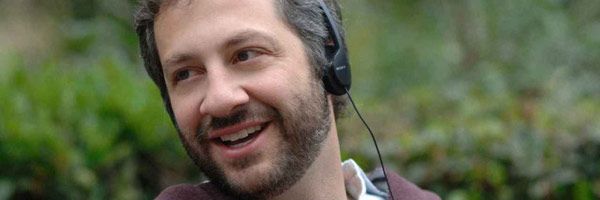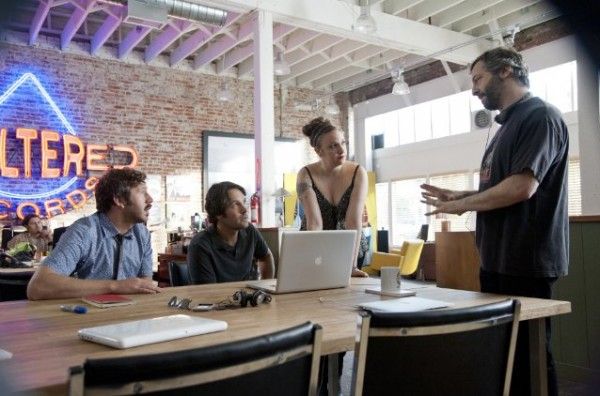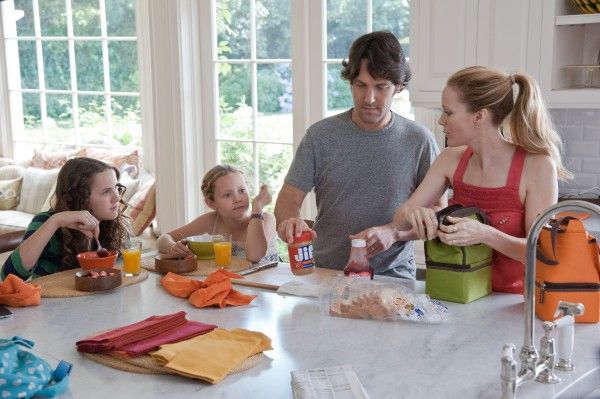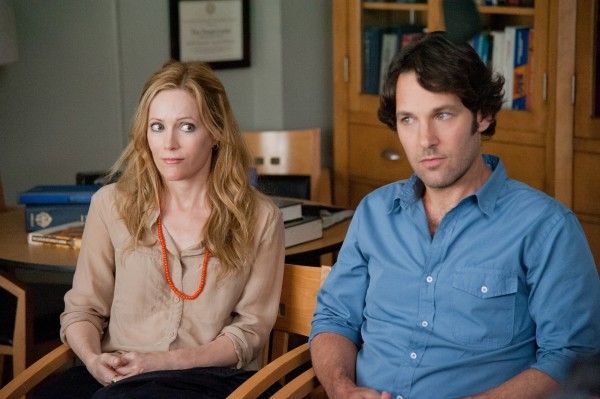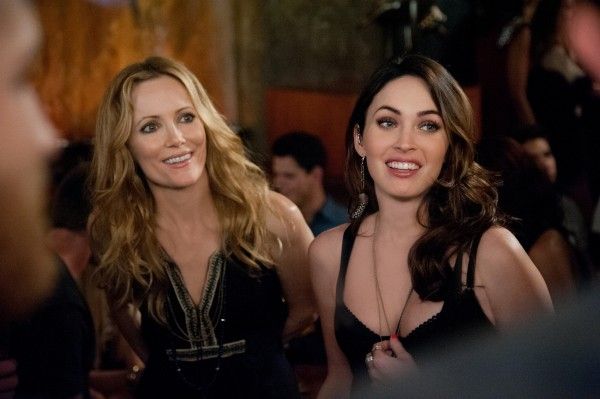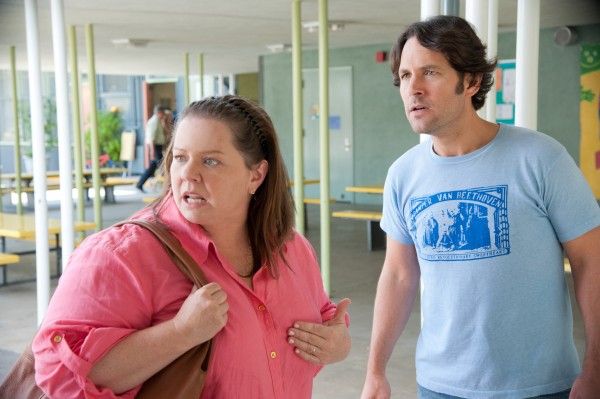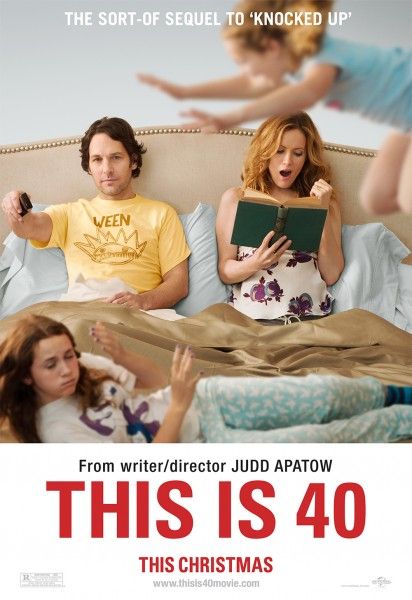Five years after writer/director Judd Apatow introduced audiences to Pete (Paul Rudd) and Debbie (Leslie Mann) in Knocked Up, their life is being revisited and explored much deeper in the honest yet hilarious look at marriage and parenthood, This is 40. Pete is struggling to keep his record label afloat, Debbie is hoping her clothing boutique will turn a profit, and their two daughters – 13-year-old Sadie (Maude Apatow) and 8-year-old Charlotte (Iris Apatow) – are just trying to navigate parents, school and boys, all while finding their way in the world together.
At the film’s press day, director Judd Apatow spoke to Collider for this exclusive interview about the biggest challenges in turning supporting character into lead characters, where he draws the line with humor, that his first cut of the film was just under three hours, how the test screening process led him to tweak things, screening his work for friends and family (including filmmakers like James Brooks and Cameron Crowe), deleted scenes for the DVD, using digital for the first time, his thoughts on 48fps and 3D, and whether there’s ever a chance that a Freaks and Geeks character could make a cameo in one of his films. He also talked about how proud he is of Lena Dunham for the success of the HBO comedy series Girls (for which he is an executive producer), the logistics of getting everyone back together for the Anchorman sequel, and that they’re working to get financing together for the Pee-Wee Herman movie. Hit the jump for what he had to say.
Collider: What were the biggest challenges in turning supporting characters into lead characters for this film?
JUDD APATOW: I felt like they were fleshed out in [Knocked Up]. To me, it was like doing another episode of a television show. Once you establish characters on a show like Girls, it’s fun to say, “Okay, now let’s do a whole episode on what’s happening with Adam Driver’s character.” That’s always felt natural to me, with every show I’ve ever worked on. There would be Larry Sanders, and then they’d say, “Let’s do a show where we spend almost all of our time with Rip Torn and see what happens.” I like that idea.
This film is so honest that the humor almost borders awkward and uncomfortable, at times. Do you have a line that you draw, as far as how far is too far to go?
APATOW: I just want it to be truthful. I’m sure I’m making a thousand judgements about what I’m comfortable saying or showing, or what serves the story. Leslie [Mann] would only be mad at me if I half-assed it. She wants to go all the way. She’s a big proponent of a balanced relationship, where they’re both equally great and equally at fault. It doesn’t make me awkward. There are only a few scenes in the movie that are really hard, but they do go all the way and I think they resonate with people because people relate to it. No matter how much you love someone, on a bad day, you could say something terrible. All of the little things that you are saving to say, that you’re mad about but never express, sometimes come out, all at once. We all have these terrible moments. That’s just part of being human. Everyone is wounded. No one is healthy enough to never screw up, when you’re in combat. But, I like to show that, and I like to show how people get back from that. You have to forgive each other. When you’re in the middle of a long-term commitment, the essence of it is that everyone is going to have good days and bad days, and it’s about how you continue to rejoin forces.
How long was your first cut of the film?
APATOW: It was probably just under three hours. All my cuts are always about three hours, at the start, mainly because any scene in the movie that’s 90 seconds, I probably shot a five-minute version of. If you just extrapolate that through the whole movie, I have a very long version of every scene, usually because, if there’s one funny joke, I’ll shoot five because I don’t know if the one I like is going to work. I’ll get back-ups because my biggest fear is to be in previews, testing the movie, and a joke doesn’t work, but I have no way to fix it because I have no other line. I also like to shoot scenes where I can see the beginning, middle and end of the entire scene. But, when you edit a movie together, you can just cut right into the middle. You don’t need to see them walk into the room and put their jacket on the chair. There’s always a lot of shoe leather that you can remove.
How did the first test screening that you did for this affect things? Did you make any major changes or do any tweaking because of that?
APATOW: It played pretty well, from the beginning. I will start the testing process with a much longer cut, to just get a sense of where they get bored, and how much time it takes to explain the basic situation before the story kicks in. It’s like having a conversation with the audience. And I see which jokes get laughs. A lot of times, it’s easy to trim the movie ‘cause you just start losing things that you thought would be there just for amusement’s sake that actually are not funny. My favorite part of the process is seeing it with an audience. I do about eight previews to see how things are working.
Who makes up your friends and family screening? Do you have people’s opinions that you trust most?
APATOW: Usually, we start and show 30 people. And then, we show 50 people. And then, we show 100 people. And we do all that just with friends, or friends of friends. And then, once we think we’re in decent shape, then we show it to 350 or 400 strangers, eight more times. I always invite all the writers and directors of all the movies that I’ve worked on. They all get forced to go to at least one of the cuts. And then, I’m always begging people like James Brooks and Cameron Crowe to come to screenings, to see what they make of it, and they’re always ridiculously helpful. They also keep me brave enough to commit to what I’m trying to do. They can be great cheerleaders for risk-taking.
Do you have a lot of deleted scenes that you could include on the DVD release?
APATOW: I do. There was a great scene where Maude and Iris got vaccinated. I got a real nurse and, in the scene, I actually gave them shots. Maude hates getting shots, so even though we were shooting the movie, she’s freaking out. It was very funny, but it served no purpose in our story. I couldn’t find a way to wedge it in. And I did do that a lot. I shot a lot of scenes, just to give the flavor of their life, and then, when I cut the movie together, I realized, “Okay, I only need these four. I don’t need the other six.” I just wanted you to believe them, as a family.
Do you have a preference for film versus digital?
APATOW: Well, this is the first movie that I’ve directed that was shot digitally. We used the Alexa camera. Our cinematographer, Phedon Papamichael, had worked with the camera before and he loves it, and I’m really happy with how it looks. I don’t know if that means I wouldn’t shoot on film again, but for the feel of this movie, I definitely wanted it to feel almost like a documentary, at times. It works really well for that. But, I’m sure there are situations where film might seem like a better choice. I haven’t really looked at the budget to figure out how much money we saved and how much time we saved by doing this, so I’m not sure what that value is. But visually, I really like how it looks.
Have you gotten to take a look at 48 fps yet?
APATOW: I haven’t seen it yet. I’m interested to see what that is. I think the story should determine the visual approach. There are situations where you want things to feel alive and like life, and there are situations that should have some magic and the separation with the grain.
Could you ever see yourself doing a 3D movie?
APATOW: I’ve thought about it, but I would need an idea that requires that. It would probably have to be something with a lot of action or visual comedy, and I’m not really in that headspace, at this moment. It’s not impossible that I’ll think of something and get excited about it, but I’m just not there, right now.
Is there any chance you might have a Freaks and Geeks character do a cameo in a film or show, in the future?
APATOW: I don’t think so. It was one of those weird situations where they canceled us early, but we were able to say everything we wanted to say, so we don’t really feel like there’s much to do there. I love sequels and I love catching up with people, but it’s already been a dozen years. I feel like we’ve told a lot of their stories through other movies. In my head, I always think of a lot of my movies as sequels to Freaks and Geeks. Knocked Up could be Ken (Seth Rogen’s character) from Freaks and Geeks. So, I don’t have a lot of need to figure out what they’re doing.
When it comes to Freaks and Geeks, do you ever wonder, “Where were all of these loyal fans when we were actually on the air? If they’d been this vocal then, maybe we would have gotten another season”?
APATOW: You know, I really thought it was going to be popular. I thought it was going to be the show people were waiting for. But, it’s hard to know what happened because sometimes it’s scheduling and marketing. We were off of the air 50% of the time. We’d be on for two weeks, and then there would be the World Series. And then, they’d pull us for sweeps, for some stunt show of some kind. You’d think, “Oh, well, people like it, so they would have liked it then, if they knew about it.” But, I don’t know if that’s the case. It’s hard to know.
Has it been exciting to see the success of Girls and see how much people really responded to that show?
APATOW: Yeah, ‘cause I’m so proud of Lena [Dunham]. She’s just one of the nicest people I’ve ever met. She has a real vision, she works hard, she’s collaborative. I feel like it’s the exact kind of show that I want to see. I feel like there’s a kinship to This is 40 and Freaks and Geeks, with a show like that. It’s brutally honest, there’s pride in being different, and I knew people would really debate it and it would challenge people. It’s been thrilling to see how much it became a part of the culture. And the second season is amazing. I really think the second season just ups the ante on the whole thing. It’s going to be a wild ride, seeing how people react to it.
As a producer, how challenging was it to get everybody back together to do the Anchorman sequel?
APATOW: You have to figure out when everyone is available because it is four people’s schedules. You have to talk about it a long time in advance and say, “All right, March 2013, we’re going.” People get offered a lot of jobs in different situations, so that had to get organized. But, other than that, I’ve never seen people enjoy making something more than Will Ferrell and Adam McKay like making Anchorman. They’re so inspired when it comes to creating ideas for it. The script couldn’t be funnier. They literally relish in every moment of it, so I think it’s going to be great.
Do you know what you’re going to be directing next?
APATOW: I don’t. I don’t have any plans, right now. I’m just going to produce Anchorman, and we’re going to start conceiving the third season of Girls.
Are you also progressing on the Pee-Wee Herman movie?
APATOW: Well, we have a really good script for that, so now we’re just in the mode to get funding for it.
This is 40 opens in theaters on December 21st.

